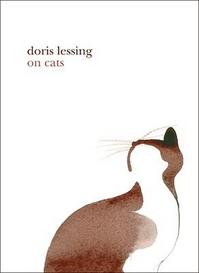Doris Lessing's "On Cats" memoir causes reflection
A few week's ago Jen Eyer began AnnArbor.com's Friday Pet Blogging section. I have since then tried multiple times to take glamour shots of my two cats, Oscar and Sunshine. While they both seem indifferent to the camera, I've managed to get a few of Sunny when she is relaxed. Oscar's curiosity, however, always trumps just when I think I've got a chance.
I was so pleased when I learned this section would be added. Why? It is true that I am easily wooed when it comes to nearly all things fluffy. But also, pets are family. When following Oscar and Sunny around with a camera, I'm essentially taking a (somewhat skewed) family portrait.
Last year, shortly before Shaman Drum closed, I purchased Doris Lessing's "On Cats" from them. This memoir thwarted any expectations I may have had.

The book is comprised of three sections: particularly cats, rufus the survivor, and the old age of el magnifico. The first section opens with childhood memories of life on her family farm in Africa. Natural threats to their livelihood included hawks, snakes, deadly spiders, and feral cats. They also had cats of their own, with the nearest vet approximately 70 miles away.
She writes of this time without sentiment. More than once I am squeamish when she conveys the perils her cats face - as kittens to hawks or to her parents methods of population control. She does love the cats that inhabit her life, but it is a very different world than the one I know.
As an adult in London she acquires grey cat - a terrible mother who is beautiful. In this cat's early days she was weaned on lobster soup and chicken mousse; the result was a finicky eater for life.
The reader also learns of the tumultuous relationship between black cat and grey cat, the adoption of orange rufus by both the author and the other feline residents, and three-legged el magnifico.
I mentioned earlier that Lessing conveys her reflections without sentiment - it is true throughout the book. At one point when living with three cats, she notes the different sorts of intelligence each has: Rufus with survivor intelligence, Charles with scientific intelligence ("You can see him wondering why a disembodied human voice emerges from a box."), and The General with intuitive intelligence.
These pieces have me reflect on my own cats - not only Oscar and Sunshine but those who were in my life before. How did those experiences shape me - in my attitudes as a pet owner and also in other life choices? (I once gave a beloved cat away because I knew she would not like the noise and chaos of a big city. I still think of her and wonder at the decision.)
Doris Lessing's essays convey deep respect for the animals that have shared her life. This book is not always a "pleasant" read, but it is a good one.

